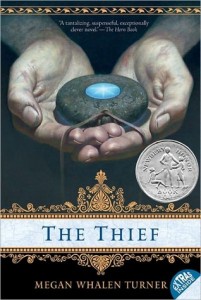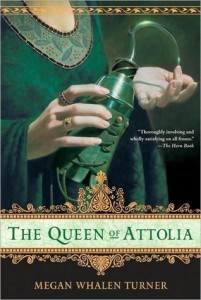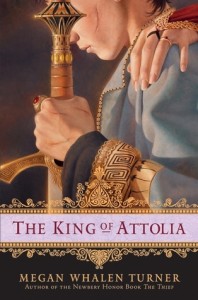 Eugenides is the protagonist of Megan Whalen Turner's The Queen's Thief series, and one of my favorite characters to boot. He is our hero, and also a thief. It's hard to talk about Gen and his disability without spoiling some of the twists in the series, but I'm going to try.
I re-read The Thief at least once a year. It's an amazing book, but what's incredible is that the sequel, The Queen of Attolia, is even more amazing. And the next one, The King of Attolia, is even better than that. I think one thing that makes the subsequent books so good is the introduction of a major stumbling block to this character who was so incredibly resourceful and infallible in the first.
Eugenides is the protagonist of Megan Whalen Turner's The Queen's Thief series, and one of my favorite characters to boot. He is our hero, and also a thief. It's hard to talk about Gen and his disability without spoiling some of the twists in the series, but I'm going to try.
I re-read The Thief at least once a year. It's an amazing book, but what's incredible is that the sequel, The Queen of Attolia, is even more amazing. And the next one, The King of Attolia, is even better than that. I think one thing that makes the subsequent books so good is the introduction of a major stumbling block to this character who was so incredibly resourceful and infallible in the first.
At the beginning of the second book, Gen is caught and suffers the traditional punishment for thievery. He loses his right hand. Cue the gasps of horror (I'll admit horror was my first reaction, too), but Gen's suffering brings a depth and realism to the series that gives it a place next to Flesh and Spirit by Carol Berg and Nightlife by Rob Thurman. Turner doesn't spare our delicate feelings.
Throughout The Queen of Attolia, Gen struggles against feeling useless. “What can you steal with one hand?” Attolia asks him. “Nothing,” he says. And he believes that, returning home to wallow in loss and misery. He learns to live with one hand, but the process is slow and he ignores everything else that used to matter to him. Gen tries to cover his pain and bitterness with a joke and a smile but still flinches every time someone mentions his missing hand.
It isn't until war comes that Gen remembers his greatest tool is his mind, not his hands, and he must be just as clever and cunning as ever in order to steal peace for his country.
This descent into self-pity until some trigger restores a character's self-respect isn't a new concept. Most of us with disabilities would recognize the feelings that threaten to swamp Gen. But what I love about Megan Whalen Turner is her subtlety. We've already read the first book. We know Gen is awesome and amazing. We had a first person view as he threw everyone for a loop in The Thief (including us) and saved the day. How could the second book have the same kind of zing and pop when we know all that? In The Queen of Attolia, Turner draws us back. She takes us out of Gen's head and lets us watch as he flounders, showing us he's not perfect. We still know that he's amazing, but there is that niggling doubt. How can he pull this off? How can he be better when he seems like he's less? We get to watch as he figures out he's still amazing and proves it to us again.
 And she does it again in the third book, pulling us even further back, putting us in the head of a character that doesn't know Gen at all. We read along, biting our nails and falling off the edges of our seats as Gen proves to Costis who he is and what he's capable of. Gen has learned to use his disability as an advantage. Yes, he uses that razor edge of his hook as another weapon, but it's more than that. He manipulates the people around him, he plays up his disability, making everyone believe he's weak and nonthreatening. They underestimate him. Every time Costis sighed in exasperation, I grinned and squealed (I try not to squeal too often, but a good book does that to me), because I knew there was something else going on. I never knew exactly what, but I trusted Gen. He was awesome and he was going to prove it in a completely new and unexpected way. And I wasn't disappointed.
And she does it again in the third book, pulling us even further back, putting us in the head of a character that doesn't know Gen at all. We read along, biting our nails and falling off the edges of our seats as Gen proves to Costis who he is and what he's capable of. Gen has learned to use his disability as an advantage. Yes, he uses that razor edge of his hook as another weapon, but it's more than that. He manipulates the people around him, he plays up his disability, making everyone believe he's weak and nonthreatening. They underestimate him. Every time Costis sighed in exasperation, I grinned and squealed (I try not to squeal too often, but a good book does that to me), because I knew there was something else going on. I never knew exactly what, but I trusted Gen. He was awesome and he was going to prove it in a completely new and unexpected way. And I wasn't disappointed.
Other characters recognize Gen's superiority despite how hard he tries to hide it. All through the fourth book, A Conspiracy of Kings, Sophos is inspired by Gen. His memories of the thief help him to push on and become a better man. Even Attolia, the woman responsible for cutting off Gen's hand, is changed by him. She is haunted by what she's done and by the end of the second book she is a very real, well-rounded character who has learned from her mistakes. I won't spoil it here, but her journey is one of the most interesting and thought-provoking pieces of this series.
I've seen reviews of The Queen of Attolia that have talked about how well-written it is, how amazing the storyline is, but the reviewers still disliked the book because it was just too painful. For Gen, for Attolia, for Eddis. And especially for the one reading it.
I can understand that. When I first read this book, it bothered me. I appreciated it, but it made me uncomfortable. I had a hard time getting past the fact that Gen lost his hand. He was ruined. He would never be the same again.
I was young. I hadn't had the experiences that make me who I am today. The thought of maiming was repulsive. Hurting or injuring someone permanently was unspeakable. It's still an uncomfortable thing, but I have a new perspective on it. We're all changed by our experiences. Sometimes permanently. It's naïve to think we might skip along through life and come out of the woods in exactly the same shape we left the house in. If you're like me, those changes aren't just to thought process or personality.
Now, when I read this book, I don't think of Gen as ruined. He's different, he's changed, and in some ways he's better. Now, I'm caught up in how he handles and overcomes his own personal hell. I see his strength and the way he adapts. I see that he is disabled but not less.
The change I had to go through to get to this point in understanding was huge. Hopefully the rest of the world can come to see this distinction without sharing all the growing pains. And maybe Gen will help them get there.
